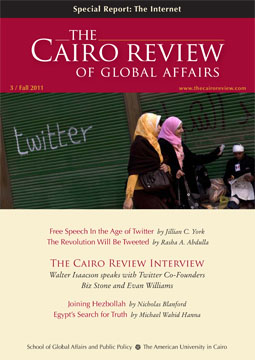Fall 2011

Cairo Review No. 3
The Internet
Q & A
“People Need Tools”
Biz Stone and Evan Williams changed the way our world talks to itself when they co-founded Twitter five years ago. They spoke with Aspen Institute President and CEO Walter Isaacson about the future of the Internet.
Essays
Free Speech in the Age of Twitter
The microblogging service has become the digital tool of choice for political and social activists. But more important than Twitter’s protest-friendly architecture is the commitment of company executives to uncensored expression.
The Revolution Will Be Tweeted
There is no doubt that social networking helped bring Egyptians to Tahrir Square for the country’s January 25 revolution. But, equally important, services like Facebook and Twitter also prepared the ground by providing a model of horizontal communication and democratic participation.
Egypt’s Search for Truth
The effort to hold the former regime of President Hosni Mubarak to account is off to a poor start. But as the experiences of other nations in transition have shown, establishing a credible record of past abuses is essential to forming a democratic culture.
The Erdoğan Effect: Turkey, Egypt and the Future of the Middle East
Turkey has adopted a pro-active foreign policy in support of democracy in the Middle East. Together with a democratic and economically strong Egypt, Turkey can help Arab countries forge an integrated regional order.
Joining Hezbollah
The militant Lebanese Shia group believes that the psychological makeup of individual fighters, rather than their weapons, is the key to their battlefield triumphs. An inside glimpse at how the Iranian-backed party sustains its war against Israel.
Midan
Oriental Hall, etc.
Happenings, speakers and events at the American University in Cairo from Fall 2011.
Africa, Famine and Solutions
In the quest for solutions, here’s a deceptively simple idea: provide Africans with better business education.
Graffiti Nation
A curious image is displayed on a wall outside the American University in Cairo’s Tahrir Square campus. Inconspicuous at first glance, the red and white chess board is more than a game. The pawns are grouped together at one end, and an upside-down king is flanked by bishops, knights, and castles at the other. An apt metaphor, to many revolutionaries, of how a ruler was toppled yet strongmen remained in power.
Book Reviews
A New Voice for Israel
J Street’s brave effort to promote peace in the Middle East.
